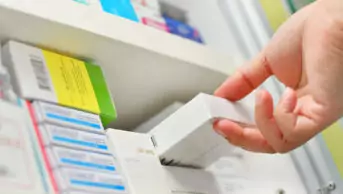
BSIP SA / Alamy Stock Photo
Pharmacists have been given powers to limit dispensing of some types of hormone replacement therapy (HRT) to three months as the government tries to mitigate the impact of ongoing supply problems.
Serious shortage protocols (SSPs) have been issued for Oestrogel (Besins Healthcare), Ovestin cream (Aspen) and Premique Low Dose (Pfizer) after concerns were raised that lengthy prescriptions were exacerbating shortages of the products.
The rules will be in place until 29 July 2022, allowing pharmacists to place a three-month limit on what can be dispensed without having to contact the prescriber.
Pharmacists are expected “to use their professional judgement” when deciding to apply the SSP — which applies to the whole of the UK — and patients must be consulted, the government said.
Women will not have to pay any additional prescription charges on further prescriptions if they have been prescribed more than the three-month allowance.
The limit on these medicines will mean more women are able to access the medication they want, a statement from the Department of Health and Social Care said.
It follows an exclusive story published by The Pharmaceutical Journal which revealed that shortages of HRT medicines are being “exacerbated” by some patients being given prescriptions for a 12-month supply.
As part of the government’s response to the HRT shortages, Madelaine McTernan, the former director general of the COVID-19 vaccine taskforce, has been appointed as the promised “HRT tsar” by health and social care secretary Sajid Javid.
“We will leave no stone unturned in our national mission to boost supply of HRT — and this next step will ensure women across the UK will be able to reliably access this vital medication and maintain this lifeline for millions who need it,” Javid said.
While several problems have underpinned HRT shortages — which have been occurring since 2018 — one key issue is that demand has risen dramatically.
There has been a 38% increase in the number of items prescribed over the past seven years.
Besins Healthcare, the manufacturers of Oestrogel, told The Pharmaceutical Journal that, while they have supplied double the volume of Oestrogel to UK wholesalers so far this year, current supply is still insufficient to meet the “continuing extraordinary” demand they are experiencing.
Gordon Hockey, director (legal) at the Pharmaceutical Services Negotiating Committee (PSNC), said: “The new SSPs are a useful measure to help ease pressure on supplies of HRT medicines most affected by stock issues.
“They are an attempt to ensure equal access to treatment for as many patients as possible. [The] PSNC will continue to liaise with DHSC to update them on the situation in pharmacies and to support efforts to address the disruption.”
Haitham Hamoda, chair of the British Menopause Society (BMS), said limiting the HRT products to a three-month supply would help women access treatment, and that this was in line with BMS general guidance that it is better to provide easy access to repeat prescribing than give out lengthy prescriptions.
Hamoda said that in the long term, it would be helpful if there was better oversight and information on what was available and what was happening with demand, adding: “Even monthly updates would be a big step because if you could see trends you could at least work on it before it becomes an issue.”
Read more: HRT prescriptions double in five years, despite supply shortages
You may also be interested in

Government advises chief pharmacists to coordinate aid between trusts amid radioisotope shortage

Mandatory ‘eight-week buffer stock’ requirement not met by medicine suppliers, reveals audit
